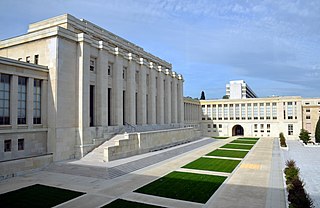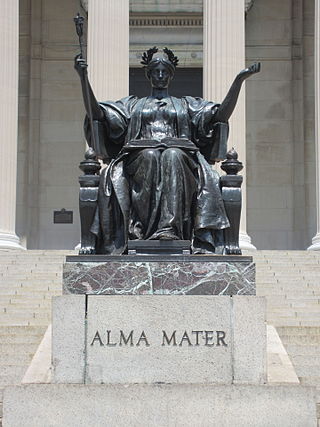Related Research Articles

The University for Peace (UPEACE) is an international university and intergovernmental organization established as a treaty organisation by the United Nations General Assembly in 1980. The university offers postgraduate, doctoral, and executive programmes related to the study of peace and conflict, environment and development, and international law.

The International Chamber of Commerce is the largest, most representative business organization in the world. ICC represents over 45 million businesses in over 170 countries who have interests spanning every sector of private enterprise.
A foundation is a type of nonprofit organization or charitable trust that usually provides funding and support to other charitable organizations through grants, while also potentially participating directly in charitable activities. Foundations encompass public charitable foundations, like community foundations, and private foundations, which are often endowed by an individual or family. Nevertheless, the term "foundation" might also be adopted by organizations not primarily engaged in public grantmaking.
A supranational union is a type of international organization and political union that is empowered to directly exercise some of the powers and functions otherwise reserved to states. A supranational organization involves a greater transfer of or limitation of state sovereignty than other kinds of international organizations.

A charitable organization or charity is an organization whose primary objectives are philanthropy and social well-being.

UNIDROIT is an intergovernmental organization whose objective is to harmonize private international law across countries through uniform rules, international conventions, and the production of model laws, sets of principles, guides and guidelines. Established in 1926 as part of the League of Nations, it was reestablished in 1940 following the League's dissolution through a multilateral agreement, the UNIDROIT Statute. As of 2023 UNIDROIT has 65 member states.

Private universities and private colleges are higher education institutions not operated, owned, or institutionally funded by governments. However, they often receive tax breaks, public student loans, and government grants. Depending on the country, private universities may be subject to government regulations. Private universities may be contrasted with public universities and national universities. Additionally, many private universities operate as nonprofit organizations.
The Euclid Consortium is a distance learning educational consortium created in 2005 by the University of Bangui, the Université Libre Internationale (Belgium), and the International Organization for Sustainable Development. The original name was Euclid University Consortium, but the structure was renamed in December 2008 in order to avoid confusion with EUCLID University, which is a member of the consortium.
The Commonwealth Foundation (CF) is an intergovernmental organisation that was established by the Commonwealth Heads of Government in 1966, a year after its sister organisation, the Commonwealth Secretariat. The Foundation is located at Marlborough House in London, a former royal palace which was assigned for the use of these Commonwealth institutions by Her Majesty Queen Elizabeth II, the former Head of the Commonwealth. As the Commonwealth agency for civil society, the Foundation is funded by 49 member states to support participatory governance through its programmes. The Foundation provides resources, grants and access to platforms to encourage better engagement between civil society and institutions of governance. Membership of the Commonwealth Foundation is voluntary and is separate from membership of the Commonwealth of Nations.

An international organization, also known as an intergovernmental organization or an international institution, is an organization that is established by a treaty or other type of instrument governed by international law and possesses its own legal personality, such as the United Nations, the World Health Organization, International Union for Conservation of Nature, and NATO. International organizations are composed of primarily member states, but may also include other entities, such as other international organizations, firms, and nongovernmental organizations. Additionally, entities may hold observer status. An alternative definition is that an international organization is a stable set of norms and rules meant to govern the behavior of states and other actors in the international system.

EUCLID, also called Pôle Universitaire Euclide or Euclid University, is an international intergovernmental organization with a university charter established in 2008. It has official headquarters in The Gambia and in the Central African Republic, but also maintains an executive office in Washington, D.C. Its primary mandate is to train officials for its Participating States but its programs are also offered to the general public. The institution's current Secretary-General is Winston Dookeran.

A university is an institution of higher education and research which awards academic degrees in several academic disciplines. University is derived from the Latin phrase universitas magistrorum et scholarium, which roughly means "community of teachers and scholars". Universities typically offer both undergraduate and postgraduate programs.
Global administrative law is an emerging field that is based upon a dual insight: that much of what is usually termed “global governance” can be accurately characterized as administrative action; and that increasingly such action is itself being regulated by administrative law-type principles, rules and mechanisms – in particular those relating to participation, transparency, accountability and review. GAL, then, refers to the structures, procedures and normative standards for regulatory decision-making including transparency, participation, and review, and the rule-governed mechanisms for implementing these standards, that are applicable to formal intergovernmental regulatory bodies; to informal intergovernmental regulatory networks; to regulatory decisions of national governments where these are part of or constrained by an international intergovernmental regime; and to hybrid public-private or private transnational bodies. The focus of this field is not the specific content of substantive rules, but rather the operation of existing or possible principles, procedural rules and reviewing and other mechanisms relating to accountability, transparency, participation, and assurance of legality in global governance.
Higher education accreditation is a type of quality assurance process under which services and operations of post-secondary educational institutions or programs are evaluated to determine if applicable standards are met. If standards are met, accredited status is granted by the agency.
The World Nuclear Transport Institute (WNTI) is an international organisation that represents the collective interests of the nuclear power and packaging industries, and those who rely on it for the safe, efficient, and reliable transport of radioactive materials. Through the WNTI, companies are working together to promote a sound international framework for the future by helping to build international consensus through co-operation and understanding. The Institute was founded in 1998. The WNTI is a private, non-profit organisation funded by membership subscriptions. Member companies are drawn from a wide range of industry sectors including major utilities, fuel producers and fabricators, transport companies, package designers, package producers and mines. Headquartered in London, the WNTI Secretariat has a small staff of qualified professionals working closely with members and other international bodies involved in the transport of radioactive materials.
The Classic Private University is a university in Ukraine. It was founded as Zaporizhzhia Institute of State and Municipal Administration (ZIDMU) in 1992. In November 2007, it changed its name from the "Humanitarian University "ZIDMU" to the "Classical Private University". The university has 6 institutes, a college. It offers postgraduate and doctoral programs in 11 specialties. There are five specialized academic councils for doctoral defense.

Translate uk:Національний університет «Одеська юридична академія» to English
References
- ↑ http://www.iau-aiu.net/sites/all/files/international.pdf%5B%5D
- 1 2 Nelson, Colin. "Regional Universities: Models for Developing Regions". AACSB Blogs. Association to Advance Collegiate Schools of Business. Retrieved 16 March 2019.
- 1 2 Ali, Syed Zahid. "Understanding the legal status of degree-granting authority of the "regional - international" universities" (PDF). Euclid. Euclid University. Retrieved 16 March 2019.